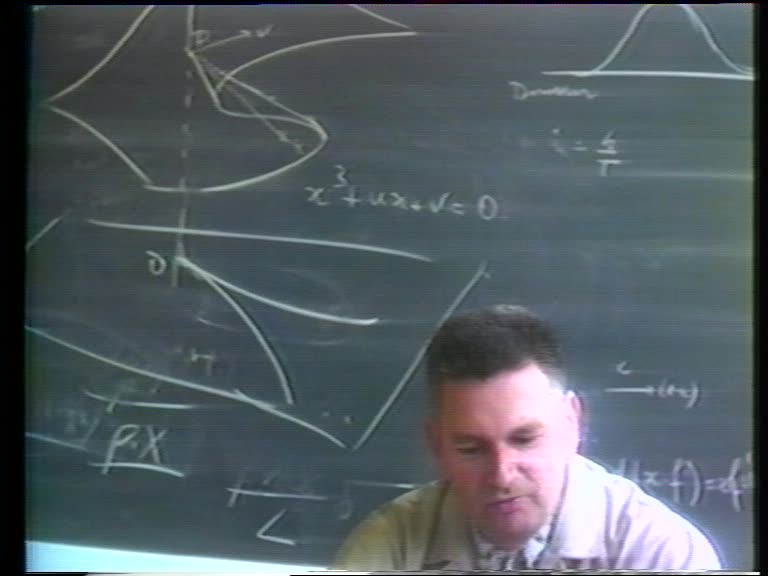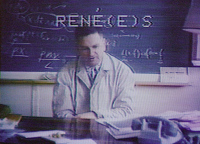


5b : René, 1976
PAL, sound, colour
After Gai Savoir (1968), coproduced by French television (ORTF) and German television (Suddeutscher Rundfunk), with the intention of financing his work with Jean-Pierre Gorin, Jean-Luc Godard accepted commissions from a number of European television channels, making politically-committed films (British Sounds for London Weekend Television and Luttes en Italie for RAI in 1969, for example) which, because they did not correspond to conventional programmes, were not broadcast at the scheduled time. During the two years that followed his meeting with Anne-Marie Miéville, he pursued the same political approach, coproducing Ici et ailleurs (1974) and Comment ça va (1976) with the INA.
Television quickly became an opportunity for a more ambitious project for the two film makers: adopting the tool so that they could denounce its contents more effectively, in 1975-76 in Grenoble they made Six fois deux / Sur et sous la communication, a series of six 100-minute programmes, each subdivided into two 50-minute programmes, this time designed for broadcast to a mass audience. The series of programmes, shown - as their title indicates - on six successive Sundays during Summer 1976, with a warning from the third channel specifying that "this programme does not have the usual features of our programmes", is an examination of the means of communication (sur), which denounces "those who stifle the truth" 1 to propose in exchange a different sort of television (sous), closer to social reality and more critical. Rigorously structured; this series associates two programmes within each film: one more theoretical, with a generic title, making use, through its editing, of confrontations of meanings; referring to a second programme, closer to reality, with a forename as its title.
If Jean-Luc Godard and Anne-Marie Miéville, aware of the difficulties posed by information caught between production and consumption, attempt here to dissect the process involved, it is to explain in order to understand and to understand in order to transform" 2 a wider economic system. In the capitalist system, there is production on one side and consumption on the other, accompanying television broadcasting. To show production, each programme has the same title sequence: an opening title sequence (a shot of a cassette inserted in a professional video machine of the time) responds to the closing title sequence (a shot of the cassette ejected), highlighting the fact that there has to be someone to manufacture the information. Above all, the production of information is related to television (sequences of extracts from political news for deaf-mutes, speech by Georges Marchais in Pas d'histoire) and cinema, but also with the press: in Jean-Luc, Jean-Luc Godard is interviewed by a journalist from the daily newspaper Libération ; Photos et Cie, whose subject is photo-reporting, denouncing the gap between amateur work (highlighted through the character of Marcel) and the work of news professionals: "They don't want progress, they want to be first." Jean-Luc Godard and Anne-Marie Miéville counter this with a critical view, muddling the information - which ought conventionally to be objective - by their subjective interventions (comments by Anne-Marie Miéville in Nanas, distancing by Jean-Luc Godard in Leçons de choses). Aware of their power in terms of opposition, they inaugurate a form of production of televised information in which we can discover the hidden side of things, notably communication being produced. Going against the conventions specific to television shows (speed and abundance of images which captivate the viewer), they prefer slow motion to leave us the time to see. Text inserts (hand-written or typed words) reveal the writing process and the raw way of filming (fixed camera considering a single angle, live film in which the hesitations and lulls are not put aside) reveals an introspection specific to Jean-Luc Godard's cinema. In this search for what is "underneath", there is an attempt to retrieve a primary language, as Gille Deleuze said of this series: "It is a question of being a foreigner in one's own language." 3
The television of opposition which Jean-Luc Godard and Anne-Marie Miéville want to make is based on the connection which they establish between production and consumption through the characters filmed who, since they are neither actors nor stars, enable consumers of television, usually considered as a global audience and not as an audience made up of individuals, to identify with them. These anonymous subjects, often outside the media, women of all ages and social conditions (Nanas), the mentally-ill (Jacqueline et Ludovic), scholars (the mathematician René), prisoners (Nous trois), film makers (Jean-Luc), can all now have their say. Jean-Luc Godard and Anne-Marie Miéville, who control their choice despite apparent improvisation, give ordinary people the privilege of appearing on television; even if what they have to say is not of general interest (the subjects of Nanas and Jacqueline et Ludovic are apparently anecdotal). Whereas production and consumption are usually separated in mass communication, Jean-Luc Godard and Anne-Marie Miéville attempt on the contrary to set up genuine communication between them: the viewer, by understanding what is going on underneath, is aware of participating in this. They even declare that we should pay viewers to watch television, since it is they who determine the production line of communication. They call into question our value codes, encouraging us to see the real beneath the superficial and to take an interest in both speech and silence. They offer us the plurality of views which conventional television obscures.
A fine human project, but above all an example of resistance in the face of the established situation, Six fois deux / Sur et sous la communication opens our senses up to others and thus constitutes genuine communication, even if television today remains unchanged.
Marie Anne Lanavère
1 Extract from the second part, Jean-Luc, of the second programme.
2 Extract from the first part, Leçons de choses, of the second programme.
3 Gilles Deleuze, "Trois questions sur Six fois deux", Cahiers du Cinéma, Paris, number 271, November 1976.